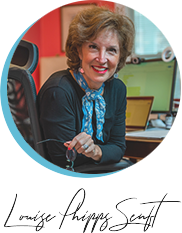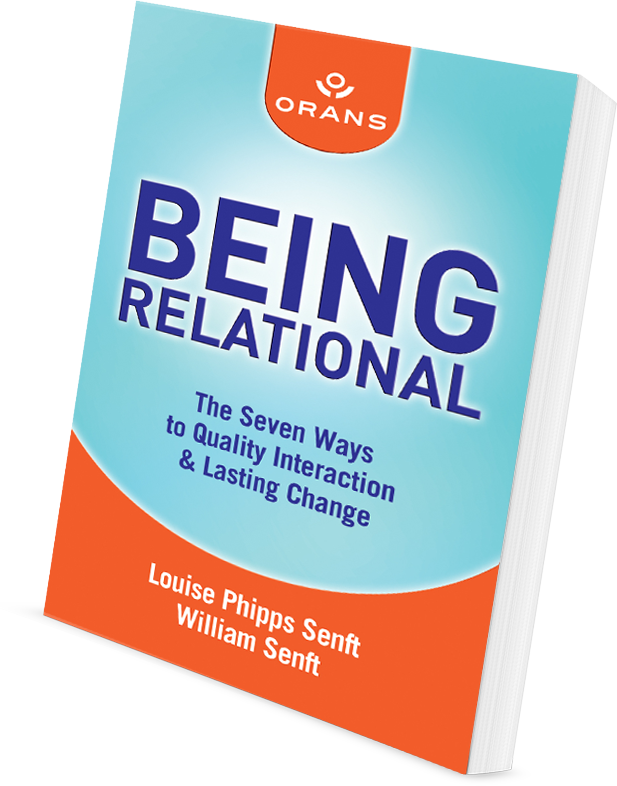
Louise has taught in the Harvard Program on Negotiation and was part of the core faculty in Harvard’s Insight Initiative.
She is a sought after mediation skills trainer for judges and senior litigators. She has received the highest award in her state of Maryland, the Chief Judge Robert Bell Award, for the advancement of Mediation, and she is author of the best-selling book, Being Relational which you can find on Amazon.
Louise was also appointed by the highest court in Kentucky to mediate the celebrated and contentious Kloiber v Kloiber tax case, a Dynasty trust which had been in litigation in 3 jurisdictions for six years, where the chief judge attempted mediation and the parties walked out. The successor chief judge appointed Louise, knowing her from her trainings. Louise closed the deal and the case in less than four months working in three jurisdications involving six parties, eight law firms, a national bank, a trust department and multiple tax experts. Forbes magazine devoted 32 pages to the case.
Being Relational™ What is it?

Being Relational™. A Relational Approach infuses everything we do at
Baltimore Mediation, at
Blink of an Eye™ nonprofit and
Blink of an Eye™ Podcast. But what does
Being Relational mean? It’s a world view. It means you care about yourself and you care about others. And you believe that no one wants to be a victim or an oppressor. So you live your life making Relational Choices, mindful of your impact for well-being and for harm. Over the past 30 years, Billy and I have been immersed in the study of quality interaction and negotiation, teaching negotiation mediation, and facilitating as mediators and relational advocates while supporting others in their negotiations. It has brought us a unique perspective on how people relate to each other and how they find their way through very difficult times. We’ve learned that people have either a transactional or a Relational approach to their interactions with others and to their lives.
We start the discussion with a transactional approach, but not because that is what we want to teach. We begin there because it is most familiar to us in our highly competitive and transactional world. We start with a transactional approach so we can better understand a Relational approach, as we compare and contrast. A transactional approach centers on a scarcity mentality and a competitive approach. Make it fair, but may the best person win! Competition makes us better – the striving, the struggle, makes us stronger and smarter. Right? A transactional approach is power based, that is power over based. Those with more power, from whatever source, will win and can maximize their gain in dealings with others resulting in the greater and greater accumulation of power by those who have it.
Being Relational, by contrast, is a worldview that grounds people in conscious and deliberate choices. For many people, the processes of interactions are automatic, based on habits governing reactions (or lack thereof) to various situations. For many people living their lives on automatic from day to day, their learned behavior, influenced by the people and systems around them, is sleepy, and on autopilot, without conscientious thought. Being Relational wakes us up! We become more aware of our thinking, feeling and behavior and their cumulative impact on ourselves and others. Based on our research and experience, we believe there are seven ways of Being Relational:
- Being Engaged
- Being Centered
- Being Grounded
- Being Clear
- Being Generous
- Being Humble
- Being Kind
Within and under each of the 7 ways are deeper reasons and outcomes for the choices we make. These 7 ways are universally applicable, within your control, and involve choices always available to you. It is relational to be engaged, centered, grounded and clear – ways of being that prevent conflict from escalating and promote quality interaction. In addition, it is relational to be generous, humble and kind – ways of being that create positive outcomes which reverberate, are paid forward, and foster clear experience shifts from being transactional to being relational, and a way of living into being relational can begin, and begin again. We can move from focusing only on self and maximizing gain, to focusing on both self and other and maximizing well-being. Learn more about this worldview in our book,
Being Relational.
 Louise has taught in the Harvard Program on Negotiation and was part of the core faculty in Harvard’s Insight Initiative.
She is a sought after mediation skills trainer for judges and senior litigators. She has received the highest award in her state of Maryland, the Chief Judge Robert Bell Award, for the advancement of Mediation, and she is author of the best-selling book, Being Relational which you can find on Amazon.
Louise was also appointed by the highest court in Kentucky to mediate the celebrated and contentious Kloiber v Kloiber tax case, a Dynasty trust which had been in litigation in 3 jurisdictions for six years, where the chief judge attempted mediation and the parties walked out. The successor chief judge appointed Louise, knowing her from her trainings. Louise closed the deal and the case in less than four months working in three jurisdications involving six parties, eight law firms, a national bank, a trust department and multiple tax experts. Forbes magazine devoted 32 pages to the case.
Louise has taught in the Harvard Program on Negotiation and was part of the core faculty in Harvard’s Insight Initiative.
She is a sought after mediation skills trainer for judges and senior litigators. She has received the highest award in her state of Maryland, the Chief Judge Robert Bell Award, for the advancement of Mediation, and she is author of the best-selling book, Being Relational which you can find on Amazon.
Louise was also appointed by the highest court in Kentucky to mediate the celebrated and contentious Kloiber v Kloiber tax case, a Dynasty trust which had been in litigation in 3 jurisdictions for six years, where the chief judge attempted mediation and the parties walked out. The successor chief judge appointed Louise, knowing her from her trainings. Louise closed the deal and the case in less than four months working in three jurisdications involving six parties, eight law firms, a national bank, a trust department and multiple tax experts. Forbes magazine devoted 32 pages to the case.
 Being Relational™. A Relational Approach infuses everything we do at Baltimore Mediation, at Blink of an Eye™ nonprofit and Blink of an Eye™ Podcast. But what does Being Relational mean? It’s a world view. It means you care about yourself and you care about others. And you believe that no one wants to be a victim or an oppressor. So you live your life making Relational Choices, mindful of your impact for well-being and for harm. Over the past 30 years, Billy and I have been immersed in the study of quality interaction and negotiation, teaching negotiation mediation, and facilitating as mediators and relational advocates while supporting others in their negotiations. It has brought us a unique perspective on how people relate to each other and how they find their way through very difficult times. We’ve learned that people have either a transactional or a Relational approach to their interactions with others and to their lives.
We start the discussion with a transactional approach, but not because that is what we want to teach. We begin there because it is most familiar to us in our highly competitive and transactional world. We start with a transactional approach so we can better understand a Relational approach, as we compare and contrast. A transactional approach centers on a scarcity mentality and a competitive approach. Make it fair, but may the best person win! Competition makes us better – the striving, the struggle, makes us stronger and smarter. Right? A transactional approach is power based, that is power over based. Those with more power, from whatever source, will win and can maximize their gain in dealings with others resulting in the greater and greater accumulation of power by those who have it.
Being Relational, by contrast, is a worldview that grounds people in conscious and deliberate choices. For many people, the processes of interactions are automatic, based on habits governing reactions (or lack thereof) to various situations. For many people living their lives on automatic from day to day, their learned behavior, influenced by the people and systems around them, is sleepy, and on autopilot, without conscientious thought. Being Relational wakes us up! We become more aware of our thinking, feeling and behavior and their cumulative impact on ourselves and others. Based on our research and experience, we believe there are seven ways of Being Relational:
Being Relational™. A Relational Approach infuses everything we do at Baltimore Mediation, at Blink of an Eye™ nonprofit and Blink of an Eye™ Podcast. But what does Being Relational mean? It’s a world view. It means you care about yourself and you care about others. And you believe that no one wants to be a victim or an oppressor. So you live your life making Relational Choices, mindful of your impact for well-being and for harm. Over the past 30 years, Billy and I have been immersed in the study of quality interaction and negotiation, teaching negotiation mediation, and facilitating as mediators and relational advocates while supporting others in their negotiations. It has brought us a unique perspective on how people relate to each other and how they find their way through very difficult times. We’ve learned that people have either a transactional or a Relational approach to their interactions with others and to their lives.
We start the discussion with a transactional approach, but not because that is what we want to teach. We begin there because it is most familiar to us in our highly competitive and transactional world. We start with a transactional approach so we can better understand a Relational approach, as we compare and contrast. A transactional approach centers on a scarcity mentality and a competitive approach. Make it fair, but may the best person win! Competition makes us better – the striving, the struggle, makes us stronger and smarter. Right? A transactional approach is power based, that is power over based. Those with more power, from whatever source, will win and can maximize their gain in dealings with others resulting in the greater and greater accumulation of power by those who have it.
Being Relational, by contrast, is a worldview that grounds people in conscious and deliberate choices. For many people, the processes of interactions are automatic, based on habits governing reactions (or lack thereof) to various situations. For many people living their lives on automatic from day to day, their learned behavior, influenced by the people and systems around them, is sleepy, and on autopilot, without conscientious thought. Being Relational wakes us up! We become more aware of our thinking, feeling and behavior and their cumulative impact on ourselves and others. Based on our research and experience, we believe there are seven ways of Being Relational: